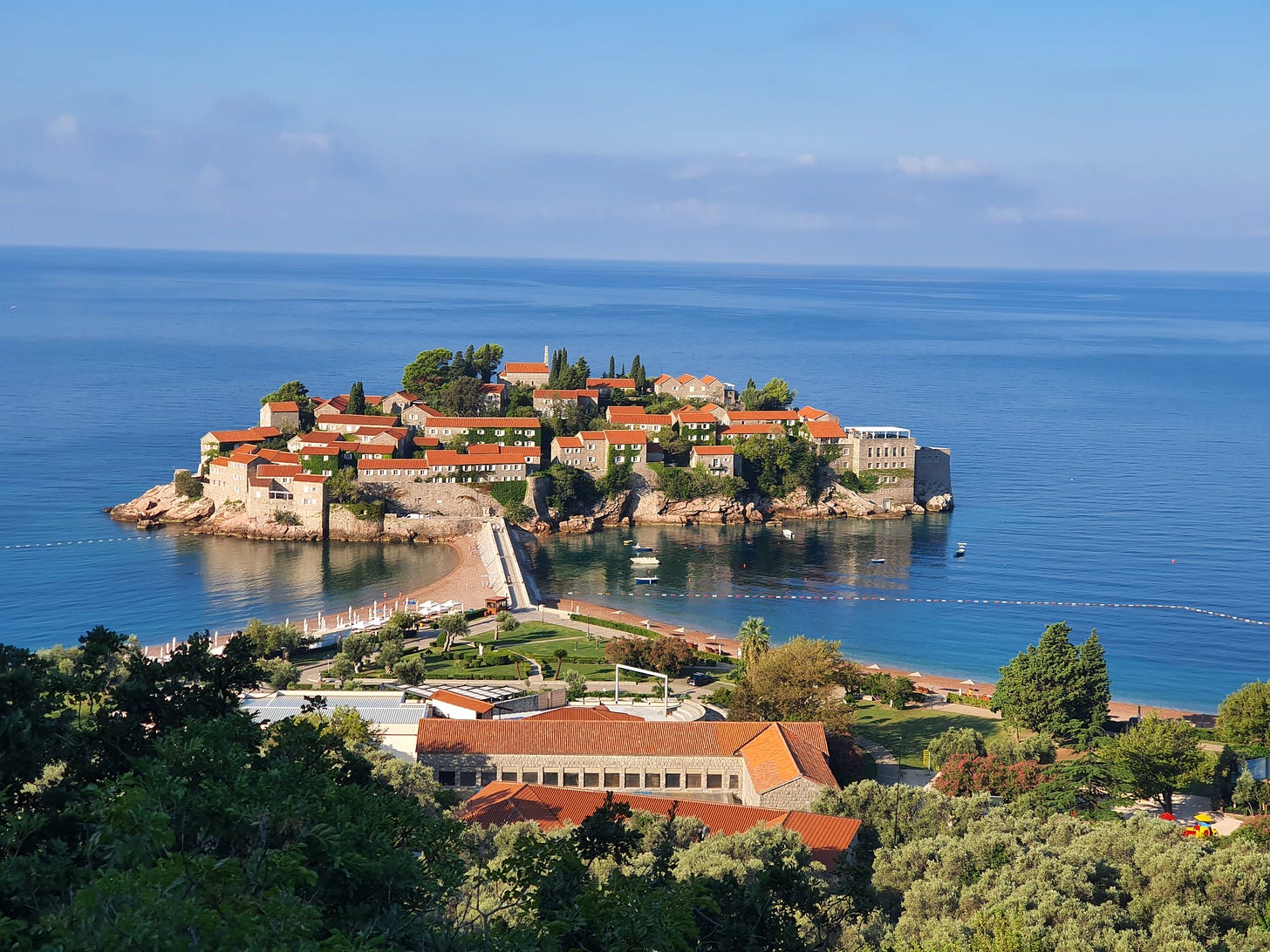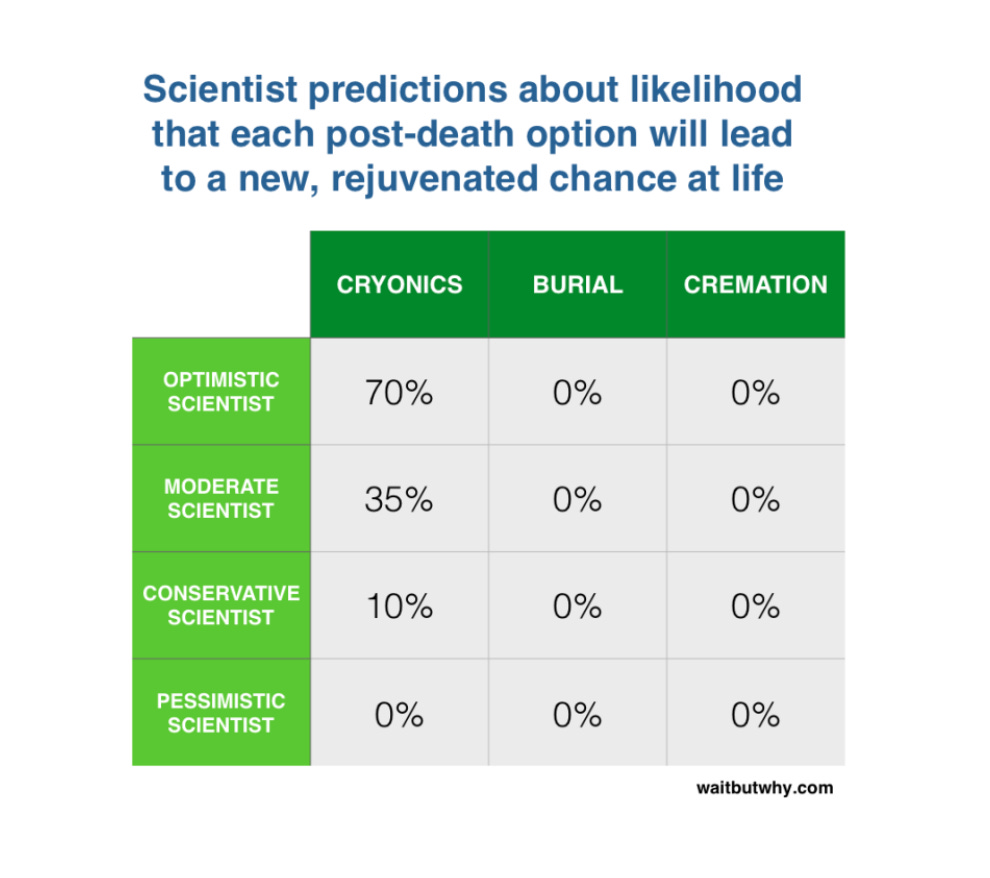The Long Game 18: Cryonics, Mindfulness, Psychedelics, Nobody Cares, Revolutions, History Has Begun
🚂 Progress and Quality of Life, Gods in the VR set, Literature Map, Nuclear Energy, and Much More!
Happy Friday!
Greetings from Montenegro 🇲🇪
In this episode, we explore:
Why cryonics makes sense
Mindfulness, meditation, psychedelics and the mental health crisis
Writing, Publishing, and the “Nobody Cares” Principle
Identifying Underrated Markets
Let’s dive into it!

My last days in this beautiful and underrated small country!
🥑 Health
🥶 Why Cryonics Make Sense
Ever since I’ve watched the movie Hibernatus, I’m fascinated by cryonics. At first, it was more about science fiction, and how crazy it could be to be rejuvenated decades or centuries after passing away.
But now, it’s becoming a reality (at least for the frozing part!), and it’s a movement that’s growing fast. For example, The Cryonics Institute proposes Cryonics services that provide hope while science and medicine advance.
But what’s the current state of the science regarding cryonics?
Waitbutwhy has a great article to explain why cryonics makes sense. This chart summarizes the idea in short.

Aubrey de Grey, Chief Science Officer of the SENS Research Foundation, recently published a paper to argue that it makes even more sense now.
A lot of progress, both technological and political, has occurred in cryonics since Ben Best made his scientific case for cryonics in this journal in 2008. Among the most encouraging examples were the demonstration of retention of memory in nematode worms after cryopreservation and revival, and the emergence of an unprecedentedly authoritative consensus around the feasibility of preserving complex mammalian tissues.
Right now, the main challenges for cryonics remain:
A mindset shift from the public: expecting the longevity problem to be resolved soon.
A logistics problem: making sure the cryopreservation process is available at the right time at the right place.
A scientific problem: proving that this method of preservation gives high chances of resuscitation.
How knows, we might even be able to take long naps one day!
🌱 Wellness
🧘♀️Mindfulness, Meditation, Psychedelics, and the Mental Health Crisis
Over the last decade, meditation and mindfulness went from a niche activity to the mainstream. Many unicorns were created in this booming space (Calm, Headspace).
In parallel, we’re witnessing a mental health crisis that’s only getting worse. As we saw in The Long Game 15:
The CDC just published a report assessing mental health during the COVID-19 pandemic. I was shocked to see that 25.5% of 18-24 years old respondents seriously considered suicide in the past 30 days ⚠️.
So why do I put these two facts together? There’s no causality here, but because the mental health space is still relatively taboo and unknown from a majority of people, there’s a lot of confusion regarding the appropriate solutions in different situations.
For example, Headspace saw its partnerships with companies skyrocket during the pandemic. The problem is that, while Headspace doesn’t claim it can treat or manage medical conditions, a growing number of companies might be relying too heavily on solutions like Headspace “in lieu of other support for more serious mental health conditions like anxiety and depression — particularly during the pandemic, when rates of both appear to be climbing” as reports this article from STAT news.
The depth of the mental health problem is so big that we will need a lot of different solutions, from the soft mindfulness apps for a broader audience to more specialized care. We should be aware that a one-size-fits-all approach won’t work here.
That’s why I believe compounds like psychedelics will have a significant role to play in curbing some mental health disorders. For example, MDMA is currently being tested in treatment for PTSD. It’s still a new field of research with a lot of potentials, but unfortunately, lacking funding. For more about this, check out The Psychedelic News Hour from Tim Ferriss.
The extent of the crisis is truly insane.
If you enjoy this newsletter, make sure to subscribe if you haven’t!
🧠 Better Thinking
✍️ Writing, Publishing, and the “Nobody Cares” Principle
As we already covered here in The Long Game 11, I’m a huge believer in writing for better thinking:
The moment you go from passively consuming information to actively producing it changes everything. You quickly realize that you didn't understand the concepts as well as you thought you did. Then, you're not merely reproducing the information, but you might end up contributing with something yours, your thoughts, your ideas, reflections!
Writing is crucial because, during the process of writing, you’ll develop your thoughts, do more research, and come up with organized arguments.
Then comes the part of publishing what you write. This second step may not be required to improve your thinking, but it adds a lot of value. When you post something, you confront your ideas to reality, you get some feedback (or no feedback, and that’s also feedback!)
A lot of people are holding back from publishing anything online. They may fear upsetting some people or writing something that’s not very interesting.
A good answer to that is: “Nobody Cares.”
As Florent Crivello points in this article, if politicians can get away with everything, you will most likely get away with your bad takes.
The bottom line here is that posting stuff online is an asymmetrical game with very high potential rewards (both in improving your thinking and in opportunities) and low risk.
This is an asymmetrical game where bad moves cost almost nothing, and good moves are worth a lot. Logic dictates that, playing such a game, you should roll the dice as long as they let you. The board game Monopoly was designed to give people an intuitive understanding of the way markets could supposedly tend towards toxic monopolies — I wish somebody designed a board game to make people understand that life is positive-sum; that the downside of most moves is never really as steep as it seems; that the upside can be unbounded.
⚡️ Startup Stuff
📌 Identifying Underrated Markets
We saw last week that the market you’re going after is the most critical factor of the equation of a startup. It’s good to know that, but it begs the question of how to identify great markets, particularly these days, because right now is the best moment to start a company.
The problem here is that if a market is obviously great, a lot of people are going to fight for it. This is why finding underrated markets is so important.
As Brett Bivens writes in this piece, the goal of a successful startup is to be non-consensus and right.
He then develops a set of questions that could help a founder discover an underrated market:
Does the audience skew “young”?
Is there a gap between engagement and monetization?
Are there artificial barriers holding back scale?
One point that I found very interesting is that in some markets, the lack of innovation from “early winners” (Amazon for Audiobooks, Apple for podcasting) “created a significant misalignment between the prevailing user experience & the job consumers want audio to fulfill for them.”
This, in turn, creates significant opportunity for companies capable of identifying market misalignment and creating a wedge to begin unwinding the status quo-conferred market power of incumbent players.
I believe it’s also happening with health. Apple’s Health app is one of the least usable apps out there, and the value people get from it is low to minimal. It’s time for innovation here!
📚 What I Read
🥇 Persistence through revolutions
I found this paper fascinating. Here’s the abstract:
Can efforts to eradicate inequality in wealth and education eliminate intergenerational persistence of socioeconomic status? The Chinese Communist Revolution in the 1950s and Cultural Revolution from 1966 to 1976 aimed to do exactly that. Using newly digitized archival records and contemporary census and household survey data, we show that the revolutions were effective in homogenizing the population economically in the short run. However, the pattern of inequality that characterized the pre-revolution generation re-emerges today. Almost half a century after the revolutions, individuals whose grandparents belonged to the pre-revolution elite earn 16 percent more and have completed more than 11 percent additional years of schooling than those from non-elite households. In addition, individuals with pre-revolution elite grandparents hold different values: they are less averse to inequality, more individualistic, more pro-market, and more likely to see hard work as critical to success. Through intergenerational transmission of values, socioeconomic conditions thus survived one of the most aggressive attempts to eliminate differences in the population and to foster mobility.
🚂 Progress of Society and Quality of Life
After reading Gonz Sanchez’s post about Barcelona, basically arguing that the quality of life was so good in Barcelona that it doesn’t push people to build great stuff. I’ve lived in Barcelona for more than a year, and I think that, unfortunately, there’s some truth to this.
I can relate to this quote, like every other fan of Barcelona:
It takes a very specific kind of personality to say no to beer and tapas to submit that pull request at 9 pm.
On the same note, I’ve read Dormin’s notes on Spain 🇪🇸, and the piece (an American sharing his month-trip in Spain) resonated with me a lot.
When I combine these two factors (economics and nice-place-to-live), it makes perfect sense that so many Europeans would embrace a traveler/ vagabond/ artist/ chill lifestyle instead of getting a “real job.” Spending a decade working at a café for twenty hours per week while sharing an apartment with two roommates, having minimal savings, and not being able to afford a car doesn’t sound great… unless you’re living in a stunning Italian city under the warm Mediterranean sun, drinking delicious Italian wine (for €2 per bottle), eating delicious Italian food, not worrying about your healthcare, and using your free time to pursue your artistic hobby and go out for drinks with friends.
I was wondering during this week whether places with insane quality of life end up pushing people to do less on average. With the rise of remote work, this question becomes even more important and remains to be answered. If you have some ideas about this, send them over!
🇮🇳 Gods in the machine
Is religion going to be disrupted by technology? The answer will be more complex than a simple yes or no, and it will take many different forms. In India, for example, with the COVID pandemic, the temples began to close, and that led VR Devotee, an app featuring live streams from many holy sites and virtual reality experiences, to success.
It’s interesting to see that technology might push people to be less religious in some parts of the globe, and do the exact opposite in others.
More generally, I’m fascinated by India and the Indian tech scene. I firmly believe India will have a significant role to play in this century. Let me know the best way to learn more about the country on Twitter or by replying to this!
🍭 Brain Food
🗺 Literature-Map
This is a beautiful project from Google. It’s a map that you can explore, where every island represents an author, and each city a book. The distance between them is based on their relationship on the web.

This is the map that you’ll get if you zoom in the novels.
🎥 What I’m watching
💎 Nuclear Energy is Clean Energy
A new concept is appearing: the Instagram/ TikTok influencers endorsing scientific projects (hopefully leaving TikTok for another platform soon.)
@isaboemeke is the first one here, with nuclear energy, but she won’t be the last.
These influencers will be essential to raising awareness among people usually very far from these topics. We need more brains to keep fueling progress.
🎙 Podcast Episode of the Week
🏰 History Has Begun with Bruno Maçães — Venture Stories
This episode is a phenomenal conversation that everyone interested in understanding the geopolitical challenges of our century should listen to. I discovered Bruno Maçães a few weeks ago, and I really like his work. He’s the author of three books, one on Eurasia, one on China, and more recently one America titled History Has Begun.
I’m particularly concerned about how Europe is entirely oblivious to what’s currently happening.
It's very pleasant and interesting to live there, but in a world where every other society turns aggressively toward the future, exploring other possibilities and exploring other worlds and exploring the technologies through which these new worlds can be created, I think it's an untenable position for Europe to remain like this because the societies that are turned toward the past end up losing ground and being overcome sooner or later. — Bruno Maçães
I took detailed public notes on the episode, which will be great for anyone who prefers reading than listening.👇👇
🔧 The tool of the Week
🥞 YourStack — Find the best apps, products, and tips recommended by top designers, developers, marketers
I love trying new products, and Yourstack is always a great source of inspiration. That’s where I discovered the Aeropress, Poolside.fm (that has a new iPhone App!), Endel, and much more!
🪐 Quote I’m Pondering
Behaviour is contagious because we catch it from other people. Much of what we do results from unconscious mimicry of others around us.
— Rory Sutherland
If you enjoyed this newsletter, make sure to subscribe if you haven’t 👇
👋 EndNote
Thanks for reading!
I will see you next week. As always, if you’re finding this newsletter interesting, give me your feedback, you can respond to this email or tweet at me!
If you’re an existing reader, I would deeply appreciate it if you share this with people who would find it a valuable resource. You can also “like” this newsletter by clicking the heart just below this, which helps me get visibility on Substack.
Have a great day,
Mehdi




